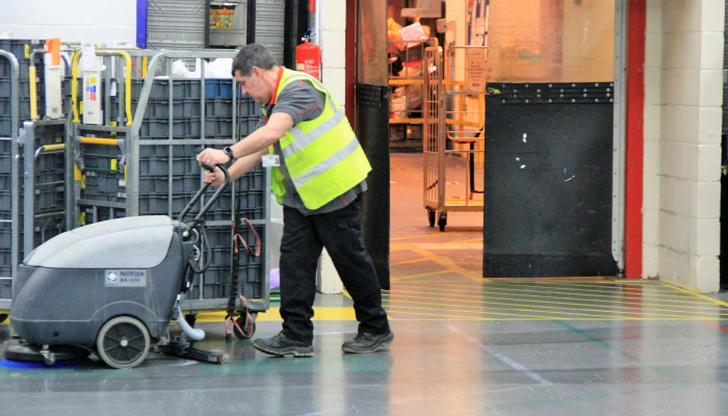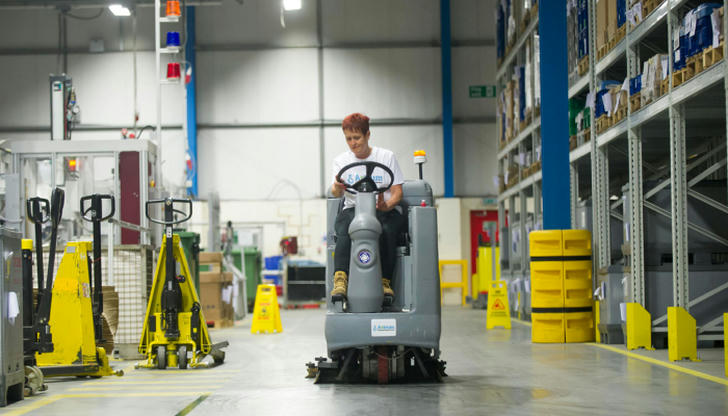A Guide to Warehouse Cleaner Recruitment
Warehouse cleaners play an essential role in maintaining cleanliness and safety in large industrial spaces, ensuring the smooth operation of supply chains and logistics. Their job is crucial in preventing accidents, improving efficiency, and creating a safe environment for employees working in the warehouse. This article explores the challenges of warehouse cleaner recruitment, the necessary skills and qualifications, and strategies that employers can use to attract and retain the best candidates.
The Importance of Warehouse Cleaners
A clean warehouse is more than just an aesthetic choice; it directly impacts safety, efficiency, and productivity. Some of the primary reasons why warehouse cleaners are essential include:
Safety: Cleanliness reduces the risk of accidents. Spills, dust, and clutter can cause slips, trips, and falls, leading to injuries.
Regulatory Compliance: Warehouses must comply with health and safety regulations, which often require cleanliness and regular maintenance.
Operational Efficiency: A tidy and organized warehouse ensures that employees can work more efficiently, reducing the time spent searching for equipment or dealing with obstacles.
Employee Well-being: A clean environment improves the overall morale of warehouse workers, contributing to a more productive and happier workforce.
The Challenges of Warehouse Cleaner Recruitment

Recruiting warehouse cleaners can be more challenging than it seems, especially with high turnover rates and the physically demanding nature of the job. Some of the key challenges include:
1. Physical Demands of the Job
Cleaning a warehouse is not a desk job. It involves a lot of physical activity such as lifting, bending, sweeping, and scrubbing. While some workers may not mind this level of physical labor, others may avoid applying for positions that demand this much energy and stamina.
Example: Many warehouse cleaners report feeling worn out after long shifts spent on their feet, especially when they have to cover large areas with minimal breaks.
2. High Turnover Rates
Warehouse cleaning jobs often face high employee turnover. Workers may leave due to the physically demanding nature of the role or seek higher-paying opportunities. This constant turnover can make recruitment more difficult.
Example: According to a study by the National Safety Council, warehouse jobs have one of the highest turnover rates across various industries, and cleaning positions are often at the top of the list.
3. Seasonal and Temporary Work
Many warehouses, especially those involved in e-commerce or retail, experience seasonal fluctuations in demand. This means that warehouse cleaning positions might be temporary or part-time, leading to challenges in attracting candidates who prefer more stable, long-term work.
Example: During peak seasons such as Black Friday or the holiday shopping period, warehouses may hire additional cleaners for short-term contracts, which can discourage potential applicants looking for permanent roles.
4. Competition from Other Employers
Given that cleaning jobs are prevalent in various industries, warehouse cleaners often have multiple employers to choose from. Employers may find themselves competing with other companies, such as hospitals, schools, or retail businesses, for the same pool of candidates.
Example: In areas with high job competition, warehouse employers may struggle to attract cleaners when other industries offer comparable wages or better working conditions.
Key Skills and Qualifications for Warehouse Cleaners

When recruiting warehouse cleaners, it’s important to understand the essential skills and qualifications necessary for success in this role.
1. Physical Stamina and Endurance
Warehouse cleaning is a physically demanding job that requires employees to remain active for long periods. Cleaners need stamina to handle tasks like lifting heavy objects, walking long distances, and operating cleaning machinery. Workers should also be able to handle dust, chemicals, and other potentially hazardous materials.
Example: A warehouse cleaner may need to push large cleaning machines through aisles or lift heavy trash bags, so employers need candidates who can perform these physical tasks safely and efficiently.
2. Attention to Detail
Warehouse cleaners must pay close attention to detail, ensuring that all areas are thoroughly cleaned and no spots are missed. This includes cleaning floors, walls, restrooms, and ensuring all waste materials are disposed of properly. A clean warehouse requires precision and diligence.
Example: A cleaner might be asked to scrub every corner of a large warehouse, ensuring no dust, dirt, or debris remains. Ignoring small areas could lead to hygiene issues or safety concerns.
3. Knowledge of Cleaning Equipment and Chemicals
Warehouse cleaners often use specialized cleaning equipment, such as floor scrubbers, pressure washers, and industrial vacuums. They must also be familiar with cleaning chemicals, knowing how to handle and use them safely to avoid accidents or damage to the warehouse environment.
Example: A cleaner might be required to use a high-powered floor scrubber to clean large areas. Understanding how to operate this equipment efficiently and safely is crucial for the job.
4. Time Management Skills
Cleaning large warehouses within tight timeframes is often part of the job. Cleaners need strong time management skills to ensure they complete tasks in a timely manner, especially in busy environments where other workers rely on the cleanliness of the space to do their jobs.
Example: A warehouse cleaner working during night shifts may need to clean an entire warehouse before morning shifts start, requiring effective time management to complete all tasks efficiently.
5. Health and Safety Knowledge
Warehouse cleaners must be aware of safety protocols to prevent accidents. This includes proper lifting techniques, handling hazardous materials safely, and using personal protective equipment (PPE) such as gloves and masks.
Example: A cleaner working around chemicals may need to know how to handle a spill or properly dispose of hazardous waste to avoid safety violations or harm to themselves and others.
Effective Recruitment Strategies for Warehouse Cleaners

Given the challenges in recruiting warehouse cleaners, employers must adopt effective strategies to attract and retain qualified candidates.
1. Offer Competitive Pay and Benefits
Compensation plays a major role in attracting talent. Offering competitive wages and benefits, including health insurance, retirement plans, and paid time off, can make the position more appealing. Consider offering overtime pay during peak seasons to attract more candidates.
Example: A warehouse may offer competitive hourly rates, along with bonuses for meeting performance goals, to ensure cleaners are motivated to work during busy periods.
2. Provide Job Stability
Given the high turnover rates in cleaning jobs, offering job stability can help retain employees. Consider offering permanent positions, especially for reliable and experienced candidates, rather than relying solely on temporary or seasonal contracts.
Example: A warehouse manager could promote long-term career opportunities to applicants, such as cross-training opportunities in other areas of warehouse management or even advancement into supervisory roles.
3. Create an Attractive Work Environment
A positive and safe work environment can help reduce turnover and improve recruitment efforts. Offering supportive management, good communication, and a focus on employee well-being can make a difference in job satisfaction and retention.
Example: A warehouse that prioritizes worker safety and provides a supportive environment, including regular safety training sessions, can help build a reputation as a good place to work.
4. Use Technology to Streamline the Hiring Process
Technology can help streamline the recruitment process and attract more candidates. Using online job boards, social media, and recruitment software can help connect with a wider pool of applicants quickly. Creating clear, engaging job descriptions that highlight the benefits of working for your warehouse can also attract qualified candidates.
Example: Posting job openings on LinkedIn, Indeed, and local job boards, and offering an easy-to-complete online application process, can help you find candidates more efficiently.
5. Offer Training and Development
Providing training opportunities can make the job more attractive to potential candidates. Offering certification programs or on-the-job training can enhance employees’ skills and make them feel invested in their career development.
Example: A warehouse could partner with local vocational schools or offer in-house training programs to teach new employees how to operate cleaning equipment and learn proper safety protocols.
Retaining Warehouse Cleaners

While attracting top talent is essential, retaining warehouse cleaners is equally important. High turnover rates can increase recruitment costs and disrupt warehouse operations. Some strategies to improve retention include:
1. Recognize and Reward Good Performance
Recognizing employees for their hard work can help improve morale and reduce turnover. Consider offering employee of the month awards, performance-based bonuses, or small incentives for consistent performance.
Example: A warehouse could offer a monthly bonus or an extra day off for employees who meet or exceed performance goals.
2. Offer Opportunities for Advancement
While warehouse cleaning may seem like an entry-level job, offering career advancement opportunities can improve retention. Employees who see a clear path for career growth are more likely to stay.
Example: Offering promotion opportunities, such as moving into supervisory or management positions, can encourage cleaners to stay and develop their careers within the company.
3. Create a Supportive Work Culture
Building a supportive, inclusive work culture where employees feel valued can increase job satisfaction. Providing regular feedback, fostering open communication, and addressing concerns promptly can all help create a positive work environment.
Example: A warehouse manager could host monthly team meetings where employees can share feedback and discuss any issues they are facing, fostering a sense of community and support.
Conclusion
Recruiting warehouse cleaners presents unique challenges, from the physical demands of the job to high turnover rates. However, by offering competitive pay, job stability, training opportunities, and a positive work environment, employers can attract and retain qualified candidates. With a strong focus on safety, efficiency, and employee satisfaction, warehouse cleaning teams can contribute significantly to the smooth operation of a warehouse, ensuring safety and productivity for everyone involved.
